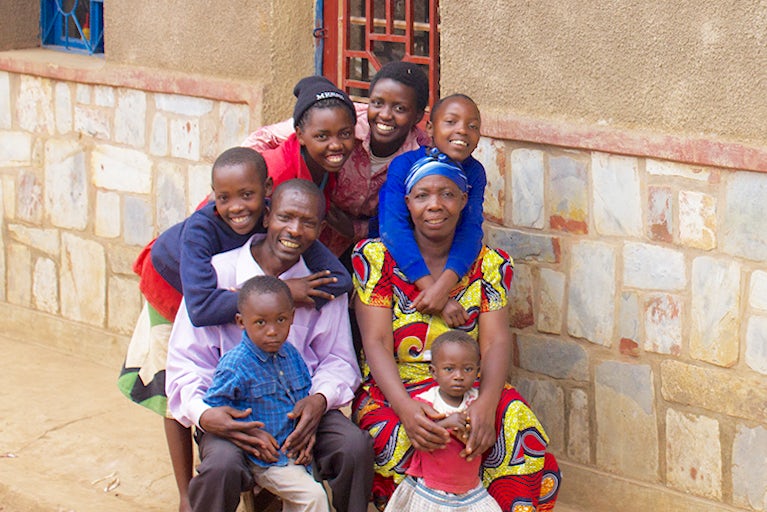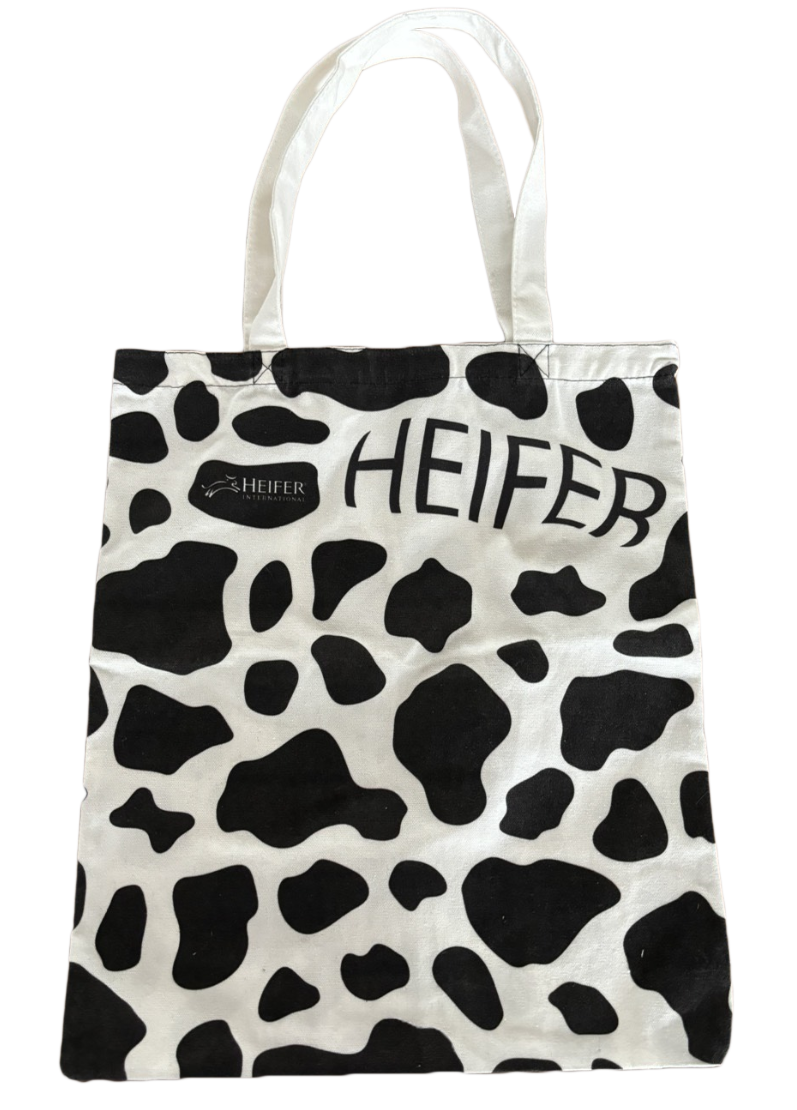Heifer International has been helping families move from poverty to self-reliance for more than 70 years. Their willingness to invest in people has brought hope and inspiration to families around the globe. Often these farmers simply lack the capital necessary to get things started. When a farmer with big dreams receives support from Heifer, amazing things can happen.
Mugambage Evariste, 50, lives in Nyarubande village, Nyarutarama cell, Byumba sector, Gicumbi District, in the Northern Province of Rwanda, with his wife Nyirahabimana Marie Saraphine, 50, their four daughters and three grandchildren.
Life was difficult for Evariste and Marie. They didn’t own any land and had very little money. When he found work, it was tending to other people’s property. The three goats and two sheep Evariste owned weren’t very productive, but he kept them around because they needed the manure for their garden.
Amidst all the hardships, Evariste and Marie’s marriage suffered.
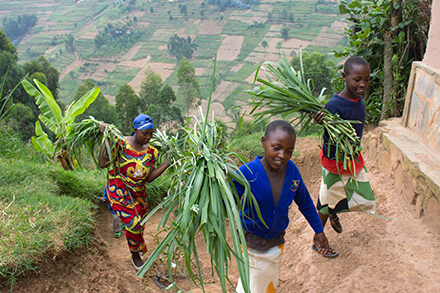
“Providing for the home is a man’s job. Sometimes I would go out to look for work and come home with no money,” Evariste said. That’s when Marie would give him “the look.”
“The little money he did earn went up in flames,” Marie said. Marie got so mad at him that at times she would refuse to speak to him or wash his clothes.
The family could only afford to eat two meals a day, usually beans and sweet potatoes. On special occasions they had cabbage, and at Christmas they would buy some meat. “Our nutrition was terrible and we were very sickly,” Evariste said. Their children were often tired and regularly suffered from intestinal worms.
Fortunately, Evariste joined a Heifer project and their life rapidly changed. He received a heifer on August 9, 2001, along with pasture seeds, a water trough and various construction materials to build a cow shed.
His original cow produced six offspring—two heifers and four bulls—and her offspring produced six more. The first heifer was passed on to another family in need, and the bulls were sold to buy a Friesian cow. The Friesian produced six more calves. To date, 18 cows have come from the one cow given by Heifer. Evariste now owns two cows, two heifers, six rabbits and a meat goat.
Before Evariste and Marie struggled to feed their children, but now they eat three healthy meals with vegetables, potatoes, carrots and pumpkin eahc day. They can afford meat once a week and their health has improved as much as their diet.
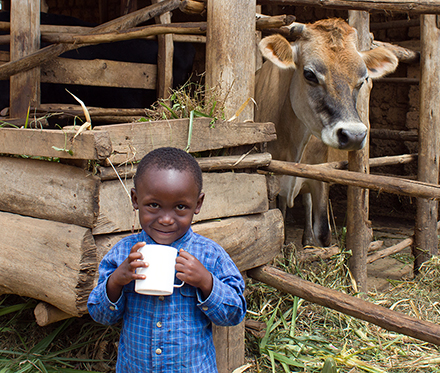
“Before, one of our children would be sick every week,” Marie said. “We have health insurance now and they no longer get sick often—the most recent was three months ago.”
Evariste has participated in many Heifer trainings, including composting, animal husbandry, pasture establishment and fodder management, vegetable and kitchen gardening and birthing animal health, which allowed him to diversify his family’s income. And in June 2010, he graduated from Community Animal Healthcare Worker (CAHW) training. He earns about $29-44 (20-30,000 RWF) per month for his animal care services.
The family’s income over the last few years has skyrocketed, thanks to the trainings and diverse investments. They earn about $354 (240,000 RWF) from potatoes and $155 (105,000 RWF) from beans annually. They have sold eight bulls and earned more than $2,800 (1,900,000 RWF). They averaged 16 quarts of milk produced every day in 2014. The family consumed 5 quarts and sold 11, earning them $1,184 (803,000 RWF) for the year.
Evariste has also invested about $3,000 (2 million RWF) in land, which is very expensive in the region. He has purchased 15 plots of land. The most expensive was $530 (360,000 RWF). Evariste has earned a lot from selling land at the right time. One was bought for $41 (28,000 RWF) and sold in 2014 for $1,900 (1.3 million RWF). Another piece of land, bought in 2008 for only $22 (15,000 RWF), was sold two years later for $442 (300,000 RWF).
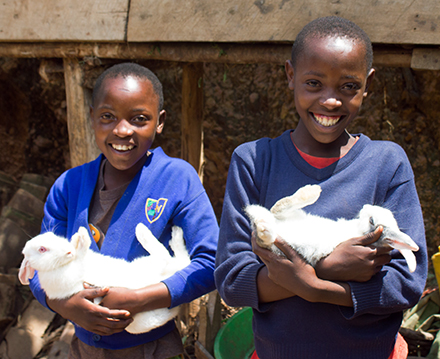
He built a home for his family and three other buildings, which he rents for about $88 (60,000 RWF) per month. Evariste also bought a milling machine. He uses one room in his rental houses for the mill and earns about $269 (182,500 RWF) per year.
Evariste bought a motorcycle in June 2014 so that he could get to farmers who needed his help quickly; however, he decided to lease it to a young man to use as a taxi. He earns $31 (21,000 RWF) per week or $1,610 (1,092,000 RWF) per year (which is almost the cost of a new motorcycle) without having to do any work. In addition, Evariste receives free rides any time he needs to visit farmers. He is no longer just a farmer, he is a CAHW, miller, landlord and an all around savvy businessman.
He wanted his children to better understand farming, hard work and the value of money. He bought his two oldest daughters sewing machines and paid for their seamstress apprenticeships. They now have their own shop in the village center where they mend old clothes and sew new ones. For his two younger daughters, Evariste bought rabbits. He told them they must take ownership and care for the animals themselves. The girls are now running their own small business, and anyone who wants a rabbit has to pay $4 (2,500 RWF), including Evariste.
One of the best outcomes of this project for Evariste and Marie is a new sense of family unity. Their relationship has improved and Evariste is happy because he is respected in his house.
“Now when [Marie] sees me coming through the gate, she smiles and greets me warmly and the children stop playing to greet me, as well,” Evariste said.
“Things are really good,” Marie said. “Once in a while he will even surprise me with some money to buy a new dress and shoes.”
Their neighbors and tenants respect them too. They usually all have breakfast together and Marie makes sure all the children have milk to drink. She is happy because her children are cared for and all of their hard work is paying off.
“Anything is possible,” Marie said. “I used to have to get water from down the hill at the well, and now I have a tap in my compound.” Electricity has replaced their kerosene lanterns and Marie hopes that one day they will be able to buy a car. They aren’t content to just sit back. Evariste and Marie are thinking about expanding their milling business to become a sorghum and grains wholesaler.
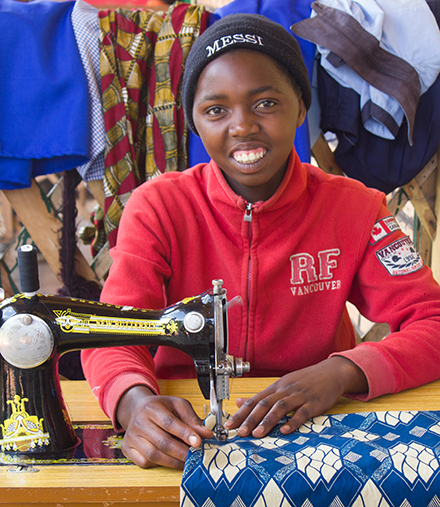
Evariste knows that without the initial investment from Heifer of one cow and the proper training, none of this would have been possible.
“[Heifer] builds your capacity and trains you. They follow-up and make sure things are going according to plan. Heifer gives you the complete package of animal husbandry training,” Evariste said. “When Heifer says they are going to help, they actually deliver. When an individual does their part, Heifer will be with you all the way.”
Story by Christian DeVries
Photos by Katya Cengel

